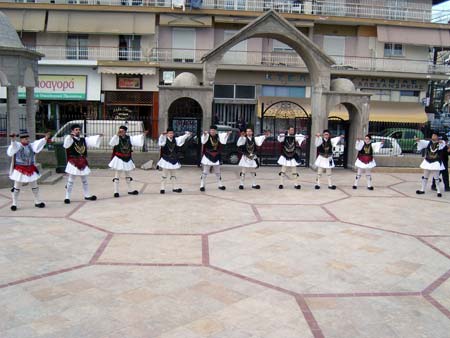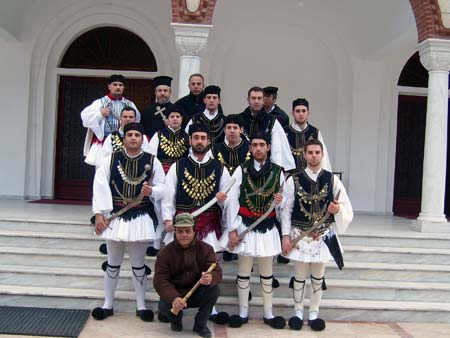
LONAP The Roumlouki. The custom “rougatzia” 2008 .
In the days of Leon the 6th (886-912) the generals of the province of Thessaloniki (where this region belonged to) did not get a salary from the state. They used to collect some money from the inhabitants of the province but it is still unknown under what criteria this procedure took place. It is about the annual pay of the military that was collected by the soldiers from the farmers. The Greek word originates from the verb rogo, which means ask for payment, whilst the word rogatio means demand.
The annual collection of money from the residents is strongly connected to the custom of Roumlouki “rougatzia” where groups of men armed with swords collected from the residents an amount of cereals once a year. The groups rambled over the villages, got into the yards of the houses and after encircling the wheat crops they collected a small part of it from each farmer. This custom took place once a year and lasted from the 26th of December until the 6th of January. As a result, the custom “rougatzia”, a word that probably originates from the word rogo, must have its origins in the annual collection of money from the residents of the province and still takes place in the villages of Roumlouki until today.
According to the custom if two groups met they made their submission to each other, otherwise their members fought to death in order to prove their superiority in protecting the region as well as their right to collect the cereal annually. When a group made its submission to another one the winners stood in two lines with their swords raised and the members of the other group had to walk through these two lines and under the swords with their heads inclined. This reminds us of the Romans who used to have a similar custom. They used three lances, two of them were fixed in the ground and the third one was fastened on their tops. The defeated had to make their submission to the winners by passing bowed under the lances.
Based on this custom of Roumlouki we assume that the soldiers invaded the villages armed once a year in order to collect from the farmers the taxes that were probably a part of their wheat crop. It is likely that the soldiers often collected the taxes by using violence and the farmers had to put up with their plundering.
During the Turkish domination the armatoloi who protected the area came once a year, at Christmas, in order to collect from the villages of Roumlouki their annual “salary”. The residents were always glad to see them and tried to assist them financially as they set their hopes for freedom on them.

LONAP The Roumlouki. The custom “rougatzia” 2008 .
After the Turkish domination, when the armatoloi were disbanded, the residents upheld this old tradition with the church’s guidance. A group of 15 young men, dressed in the local costume (fustanella) and armed with swords rambled over the villages and danced from house to house in order to collect money and cereals for the church-wardens, who used them to build schools and churches. The young men selected (rougatzaroi) had to be tall, strong and handsome, whilst the best three of them were the captains (leaders). After learning the folk dances they went to the church on December 26, genuflected the icons and set out on the villages. The church-wardens walked in front of them and asked for permission to enter the villages. If the permission was given the dance-band started playing folk music and the rougatzaroi entered the village with a dancing step. Their dances were particularly lively and included genuflecting, walking, running and shouting, encircling the cereals that were offered. The farmers placed at the center of their threshing floors a tin filled with wheat or maize and welcomed the men there. The captain made the sign of a cross with his sword on the gift offered and on the door of the house. After that the church-wardens loaded their carts with the wheat and they altogether visited the next house.
The different groups of the villages should not meet one another. If they did they had to make their submission to each other, which means that each group had to bow in front of the swords of the other one. But the captains would not allow it so the groups fought to death. In Kydonia there is a place called “rogatziko” that owes its name to a battle between two groups. After that, the church replaced the real swords of the men with wooden swords that could not inflict fatal wounds. This custom is still very popular in Roumlouki and gives the young men the opportunity to show their gallantry and their dancing skills. It was a great honor to be chosen as one of the men of the “rougatzia”. There are plenty of folk songs that call the young men to get prepared for the great custom.
Alexandreia of Imathia
Ioannis D. Moschopoulos
Lawyer
Researcher of History and Folklore